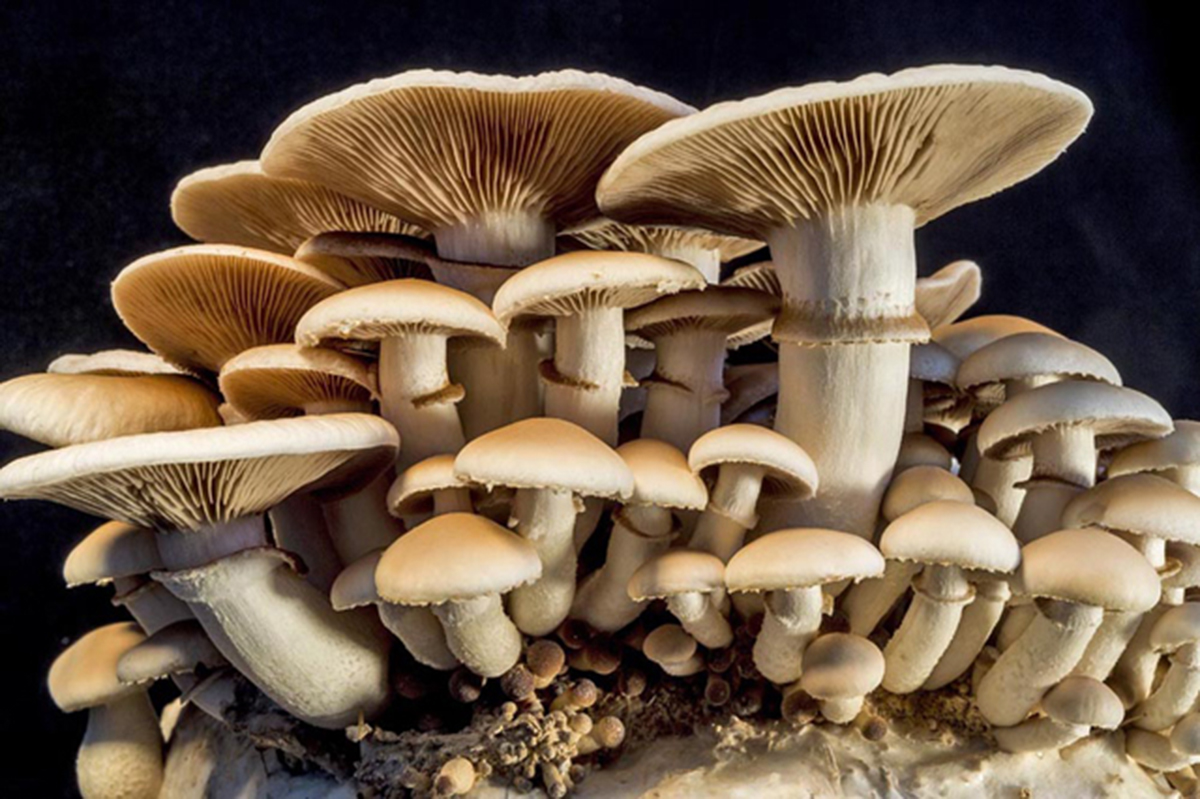Table of Contents
Mushrooms in general have minimal carbs and calories, but boast valuable nutrients that boost health and improve the body’s immune system. Replacing unhealthy food with mushrooms can be a great way to lose weight. Apart from the fact that mushrooms in general are virtually carb and calorie free, some types including Ganoderma lucidum (see photograph below) reduce resistance to insulin – one of the major problems faced by obese people. They are also an unbelievably healthy food.
A study report published in the Journal of the Federation of American Societies for Experimental Biology (FASEB) in 2013 states that the consumption of mushrooms was “positively associated with higher intake of most nutrients and better diet quality.” The study, undertaken at Louisiana State University’s Agricultural Center between 2001 and 2010, compared diet quality using the Healthy Eating Index – 2005 (HEI). It was the first study of its kind, and involved consumption of the 10 most common mushroom types sold in the USA, including Agaricus bisporus.

Ultimately the study recommended that “consumption of mushrooms should be encouraged” by health professionals, preferably without the addition of salt.
Ganoderma Lucidum
Also known as lingzhi (in China) or reishi mushrooms (in Japan), Ganoderma lucidum is one of the best-known medicinal mushrooms and has been used to promote longevity and health in Asian countries for centuries. Known to have a myriad of therapeutic properties that are said to help just about anything from helping insomnia to improving cardiac function and boosting the immune system, extract of G. lucidum is used in hundreds of health products.
Although not tested on humans for efficacy of weight loss, a Chinese study published in Nature Communications in June this year (2015) shows that Ganoderma lucidum reduced inflammation, insulin resistance and body weight of mice that were fed a high-fat diet. The study showed that the water extract from the mushrooms that they fed the mice reversed gut dysbiosis induced by the high fat diet, and also reduced obesity-related metabolic endotoxemia, at the same time maintaining intestinal barrier integrity. The study also showed that when mice were given “an unhealthy diet” plus high doses of mushroom extract, they gained much less weight than the mice that weren’t fed mushroom.
Portobello Mushrooms
Another more recent study report published in the FASEB Journal (April 2014) indicates that Portobello mushrooms are also an effective aid to weight loss and can improve weight management, because the properties in the mushrooms regulates blood sugar, particularly in young women.
The study, carried out by the University of Buffalo’s Department of Nutrition Science, indicated that eating Portobello mushrooms had the effect of regulating glucose levels and reducing insulin. In addition to a powerful antioxidant, egotheioneine, the mushrooms were found to contain a phytonutrient element that helps to normalize blood sugar rapidly, in less than half an hour. Together these ingredients were also found to help protect against tissue damage.
Apart from being fat-free, Portobello mushrooms are full of nutrients including niacin, copper and selenium, as well as protein, fiber and vitamin D and make a good addition to any diet.
READ Shiitake Mushrooms: a Powerful Immune System Booster
White Button Mushrooms
A one-year randomized clinical trial undertaken by researchers at the John Hopkins Bloomberg School of Public Health’s Weight Management Center in Baltimore, Maryland, found that overweight or obese adults who substituted meat for white button mushrooms lost more weight than those who remained on a “standard diet” containing lean beef.
Information about the study published in the FASEB journal in April 2013 explained that decreased energy density was the main strategy that controlled obesity. Participants who had eaten about a cup of mushrooms rather than meat every day, consumed less fat and lower energy (kcals) and lost on average 3.6 percent of their starting body weight – amounting to about 7 lbs (3 kg) each.
- www.fasebj.org/cgi/content/meeting_abstract/27/1_MeetingAbstracts/852.4
- www.nature.com/ncomms/2015/150623/ncomms8489/full/ncomms8489.html
- www.ncbi.nlm.nih.gov/books/NBK92757/
- www.ncbi.nlm.nih.gov/pmc/articles/PMC3445909/
- www.ncbi.nlm.nih.gov/pubmed/21328977
- www.ncbi.nlm.nih.gov/pubmed/23735479
- www.ncbi.nlm.nih.gov/pubmed/19323731
- www.ncbi.nlm.nih.gov/pmc/articles/PMC3763079/
- www.fasebj.org/cgi/content/meeting_abstract/27/1_MeetingAbstracts/lb350
- www.omicsonline.org/mushroom-intake-is-associated-with-better-nutrient-intake-and-diet-quality-2155-9600.1000229.pdf
- www.medicaldaily.com/mushrooms-weight-loss-portobello-mushrooms-stabilize-blood-glucose-levels-help-women-lose-weight
- www.buffalo.edu/ubreporter/research/news.host.html/content/shared/university/news/ub-reporter-articles/stories/2014/May/horvath_portabellas.detail.html
- www.fungihealth.com/medicinal-mushrooms-and-weight-loss
- www.academia.edu/305933/Medicinal_Mushrooms_Their_therapeutic_properties_and_current_medical_usage_with_special_emphasis_on_cancer_treatments
- articles.mercola.com/sites/articles/archive/2015/07/06/medicinal-mushroom.aspx
- www.herbalremediesadvice.org/herbal-and-medicinal-mushrooms.html
- Photo of ganoderma lucidum courtesy of Wikipedia - https://en.wikipedia.org/wiki/Lingzhi_mushroom#/media/File:Jreishi2.jpg
- Photo of shitake mushrooms courtesy http://themindunleashed.org/2014/07/5-types-medicinal-mushrooms-boost-health.html
- Important notification about information and brand names http://www.steadyhealth.com/polices/terms-of-use#copyright


Your thoughts on this